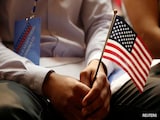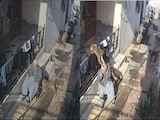A UN worker carried luggage towards a vehicle outside a guesthouse which was attacked by the Taliban in Kabul on October 29. (NYT image)
Kabul:
Most U.N. workers here were confined to their living quarters on Thursday in the aftermath of a deadly assault on a U.N. guesthouse, and some were moved to more secure housing as foreigners working in Kabul reassessed their security.
On Wednesday, gunmen associated with the Taliban entered the compound of the guesthouse and killed eight people, including six foreign staff members. The authorities said the gunmen would have killed far more people had they not been held off by U.N. guards, who engaged the assailants in a fierce gun battle, killing three of them.
The assault unnerved many international organizations working here, underscoring the vulnerability of their workers. "Before yesterday, the risk was there, but it was a virtual risk," said Laurent Saillard, director of the Agency Coordinating Body for Afghan Relief, which represents nonprofit aid organizations here.
"Now, it's become a reality. Any group that is well organized and determined can do it," Saillard said. "We are not secure like a military camp or an embassy. It's easy. They crossed a line."
Attacks on international aid workers are not new, but Saillard said he believed that this was the first time a compound had been attacked in this way. Attacks on aid groups, he said, are "higher now than in the last six years."
The mayhem on Wednesday brought to 23 the number of aid workers killed here this year. The vast majority of attacks are on Afghan nonprofit groups, not international organizations or international workers, Saillard said.
The U.N. mission here halted operations while it reviewed security. U.N. flights between Afghanistan and neighboring Pakistan were suspended until at least Saturday.
A Taliban spokesman on Wednesday said the attack was intended to warn people not to take part in the Nov. 7 runoff presidential election, in which the U.N. mission is helping with preparations. The mission was also involved in monitoring the August election. President Hamid Karzai appeared to have won that vote, but he eventually bowed to international pressure to hold a runoff after widespread fraud in his favor was discovered.
In its work here, officials of the U.N. mission have made a point of emphasizing the organization's impartiality. As a result, they found Wednesday's attack particularly shocking. They have tried to impress on Afghans that the mission does not favor any side in the conflict with insurgents and is unlike the foreign military forces here. ...(Continued on next page)
They have pointed to their investigations of civilian casualties and other human rights abuses that have angered the Afghan population, and have tried to improve government services.
Although the United Nations is not immune from the violence here - three of its foreign election workers were kidnapped in 2004 - its workers have gone largely untouched. In the last two years it has expanded the number of its provincial offices, a reflection of good relations with the general population and the reputation for impartiality.
In the runoff, Karzai will face Abdullah Abdullah, who was the next largest vote-getter in the election in August, and there are fears that fraud may occur again.
If U.N. workers are constrained from working at full strength because of security fears, they will most likely be less able to safeguard the integrity of the runoff.
Complicating matters is an announcement by Afghanistan's Independent Electoral Commission that in the runoff it plans to open more polling centers than in the first election.
The move by the commission, which has been accused of favoring Karzai, ran counter to the advice of the United Nations and election observers who had called for fewer polling centers, to reduce the possibility of fraud.
Much of the fraud in the August vote occurred in what monitoring officials have called "ghost" polling centers, mostly in remote areas, which existed only on paper. More than one million fraudulent ballots, most for Karzai, were counted from those centers.
The chairman of the commission, Azizullah Ludin, defended the decision to increase the number of polling centers, saying that security forces had confirmed that the commission would be able to safely open 6,322 polling centers. He said that a number of senior election officials who had been suspended over allegations of fraud would not be employed for the second round and that approximately 150 midlevel district coordinators would also be excluded from working on the election.
Also on Thursday, the NATO-led forces here announced that two members of the international force had died in separate roadside bomb attacks on Wednesday in southern Afghanistan.
In Kandahar, Ahmed Wali Karzai, the president's brother, held a news conference to rebut statements in an article in The New York Times on Wednesday that said he had been paid by the CIA for much of the past eight years, rented a compound to the agency and helped it run the Kandahar Strike Force, a paramilitary group. Karzai categorically denied having any relationship with the CIA and also said that he was not involved in the lucrative narcotics business in southern Afghanistan.
On Wednesday, gunmen associated with the Taliban entered the compound of the guesthouse and killed eight people, including six foreign staff members. The authorities said the gunmen would have killed far more people had they not been held off by U.N. guards, who engaged the assailants in a fierce gun battle, killing three of them.
The assault unnerved many international organizations working here, underscoring the vulnerability of their workers. "Before yesterday, the risk was there, but it was a virtual risk," said Laurent Saillard, director of the Agency Coordinating Body for Afghan Relief, which represents nonprofit aid organizations here.
"Now, it's become a reality. Any group that is well organized and determined can do it," Saillard said. "We are not secure like a military camp or an embassy. It's easy. They crossed a line."
Attacks on international aid workers are not new, but Saillard said he believed that this was the first time a compound had been attacked in this way. Attacks on aid groups, he said, are "higher now than in the last six years."
The mayhem on Wednesday brought to 23 the number of aid workers killed here this year. The vast majority of attacks are on Afghan nonprofit groups, not international organizations or international workers, Saillard said.
The U.N. mission here halted operations while it reviewed security. U.N. flights between Afghanistan and neighboring Pakistan were suspended until at least Saturday.
A Taliban spokesman on Wednesday said the attack was intended to warn people not to take part in the Nov. 7 runoff presidential election, in which the U.N. mission is helping with preparations. The mission was also involved in monitoring the August election. President Hamid Karzai appeared to have won that vote, but he eventually bowed to international pressure to hold a runoff after widespread fraud in his favor was discovered.
In its work here, officials of the U.N. mission have made a point of emphasizing the organization's impartiality. As a result, they found Wednesday's attack particularly shocking. They have tried to impress on Afghans that the mission does not favor any side in the conflict with insurgents and is unlike the foreign military forces here. ...(Continued on next page)
They have pointed to their investigations of civilian casualties and other human rights abuses that have angered the Afghan population, and have tried to improve government services.
Although the United Nations is not immune from the violence here - three of its foreign election workers were kidnapped in 2004 - its workers have gone largely untouched. In the last two years it has expanded the number of its provincial offices, a reflection of good relations with the general population and the reputation for impartiality.
In the runoff, Karzai will face Abdullah Abdullah, who was the next largest vote-getter in the election in August, and there are fears that fraud may occur again.
If U.N. workers are constrained from working at full strength because of security fears, they will most likely be less able to safeguard the integrity of the runoff.
Complicating matters is an announcement by Afghanistan's Independent Electoral Commission that in the runoff it plans to open more polling centers than in the first election.
The move by the commission, which has been accused of favoring Karzai, ran counter to the advice of the United Nations and election observers who had called for fewer polling centers, to reduce the possibility of fraud.
Much of the fraud in the August vote occurred in what monitoring officials have called "ghost" polling centers, mostly in remote areas, which existed only on paper. More than one million fraudulent ballots, most for Karzai, were counted from those centers.
The chairman of the commission, Azizullah Ludin, defended the decision to increase the number of polling centers, saying that security forces had confirmed that the commission would be able to safely open 6,322 polling centers. He said that a number of senior election officials who had been suspended over allegations of fraud would not be employed for the second round and that approximately 150 midlevel district coordinators would also be excluded from working on the election.
Also on Thursday, the NATO-led forces here announced that two members of the international force had died in separate roadside bomb attacks on Wednesday in southern Afghanistan.
In Kandahar, Ahmed Wali Karzai, the president's brother, held a news conference to rebut statements in an article in The New York Times on Wednesday that said he had been paid by the CIA for much of the past eight years, rented a compound to the agency and helped it run the Kandahar Strike Force, a paramilitary group. Karzai categorically denied having any relationship with the CIA and also said that he was not involved in the lucrative narcotics business in southern Afghanistan.















